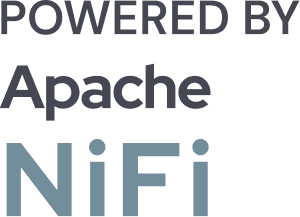Data Flow Manager vs Ansible for Apache NiFi Data Flow Deployments
![]()

Apache NiFi plays a crucial role in many organizations by enabling real-time data movement, transformation, and security. However, deploying NiFi data flows across various environments often becomes a manual, error-prone, and complex process, introducing significant risks.
While tools like Ansible are widely used for automation, they are not tailored for the nuances of NiFi. Ansible treats NiFi as a general system, overlooking key elements like NiFi data flow versioning, rollback, validation, and collaboration.
What if there were a solution designed specifically for NiFi? A tool that automates NiFi data flow deployments, ensures comprehensive tracking of changes, enables instant rollbacks, and requires no custom scripting?
Data Flow Manager is a purpose-built on-premise solution to create, deploy, and promote NiFi flows in minutes, without using the NiFi UI and controller services.
In this blog, we will explore how Data Flow Manager compares to Ansible and why it is the ideal solution for organizations seeking a reliable, efficient, and seamless NiFi data flow deployment process.
An Overview of Data Flow Manager
Data Flow Manager simplifies the creation, deployment, and promotion of flows across NiFi environments. It empowers NiFi developers and platform engineers to create and deploy NiFi data flows on their own, without requiring extensive scripting knowledge.
As a result, it significantly reduces the reliance on “NiFi power users”. Additionally, it frees up the IT operations team from providing support for ad-hoc NiFi data flow deployments.
Key Features of Data Flow Manager:
- Effortless NiFi Data Flow Deployment and Promotion: Deploy and promote NiFi data flows across multiple clusters effortlessly in minutes, without the hassle of switching between different NiFi UIs for each environment.
- Scheduled NiFi Data Flow Deployment: Schedule NiFi data flow deployments to occur during business hours or off-hours, including weekends, enabling better resource planning and eliminating the need for developers to work overtime.
- Detailed Audit Logs: DFM captures and logs every action associated with NiFi data flow deployment with metadata, including who deployed a flow, what was deployed, and when. This ensures full traceability and compliance.
- Version Control and Rollback: Seamlessly manage flow versions through integrated version control. Easily roll back to a previous stable version of NiFi data flows in case of issues, minimizing downtime and deployment risks.
- AI-Powered Flow Creation Assistant: Generate NiFi flows for common use cases instantly with an AI assistant.
- Flow Performance and Structure Analysis: Gain real-time insights into the performance and structure of NiFi data flows to identify bottlenecks, inefficient processors, and structural issues.
An Overview of Ansible
Ansible is an open-source automation tool widely used for configuration management, application deployment, and task automation across IT environments. It operates through simple, human-readable YAML scripts (playbooks) and uses an agentless architecture, making it easy to get started.
While Ansible excels at general-purpose automation, it lacks native support for Apache NiFi. It requires custom scripts and workarounds to manage NiFi data flow deployments. This makes it less efficient and more error-prone for teams looking to automate NiFi data flow promotions.
Data Flow Manager vs Ansible – Reasons Why DFM is the Ideal Choice for NiFi Data Flow Deployments
Below, we compare the two tools across key parameters to highlight why DFM is the better fit for NiFi data flow deployments.
| Parameters | Data Flow Manager | Ansible |
| Purpose-built for NiFi | Yes. DFM is designed specifically for creating, deploying, and promoting NiFi data flows. | No. Ansible is a general-purpose automation tool, not tailored for NiFi. |
| Ease of Use | Intuitive interface for deploying and managing NiFi data flows, requiring no scripting expertise. | Requires writing YAML scripts, making it more complex for NiFi data flows. |
| Flow Versioning | Built-in version control via NiFi Registry, providing complete visibility. | Manual versioning needed; requires managing flow.xml.gz or templates. |
| Change Tracking | Automatically tracks changes and versions of NiFi data flows. | Custom logic or manual tracking is needed, adding complexity. |
| Rollback Capability | Easy rollback to previous NiFi data flow versions with minimal effort. | Rollback is manual, error-prone, and typically requires additional steps. |
| Integration with NiFi Registry | Native and seamless integration with NiFi Registry for smooth NiFi data flow deployments. | Requires extra scripting to push/pull data from the NiFi Registry. |
| Validation Before Deployment | Can validate NiFi data flows before deployment to prevent issues. | No built-in validation; must be implemented manually. |
| Real-time Feedback | Immediate feedback from the UI, making troubleshooting and corrections easier. | No real-time feedback; requires checking logs manually for troubleshooting. |
| Error Handling | Hassle-free. | Error tracking is based on scripts/logs, which is less intuitive. |
| Team Collaboration | Supports collaborative NiFi data flow deployment with version control and easy sharing. | Limited support for collaboration; harder to share and work on code/scripts simultaneously. |
| Security & Access Control | Integrated with NiFi’s user policies for seamless security management. | Requires manual management of permissions and security settings. |
| NiFi Data Flow Deployment Automation | Supports automated NiFI data flow deployment through NiFi Registry integration, streamlining the processes. | Can be automated with considerable effort, but often requires custom configuration. |
Key Benefits of Using Data Flow Manager over Ansible
1. Faster Time-to-Deploy
With Data Flow Manager, NiFi data flows can move from development to production in minutes, not hours. The scheduling capabilities, robust control & security, and native NiFi registry integration eliminate the wait times and scripting cycles typically involved with Ansible.
2. Reduced Operational Overhead
DFM requires zero scripting and minimal NiFi expertise. This means your platform engineers, DevOps teams, and even NiFi developers can manage NiFi data flow deployments independently, freeing up your senior engineers from repetitive, low-value tasks.
3. Lower Risk of NiFi Data Flow Deployment Failures
DFM’s built-in flow validation, real-time feedback, and audit logging drastically reduce the chances of pushing broken or misconfigured NiFi data flows to production. With Ansible, such safeguards require manual implementation or are missing altogether.
4. Empowered Collaboration Across Teams
Unlike script-based tools that limit collaboration to a few technically inclined team members, DFM promotes shared visibility and control across your NiFi ecosystem, making it easy for teams to track changes, roll back mistakes, and align on flow versions.
5. No Specialized NiFi Talent Required
DFM dramatically lowers the barrier to entry. Platform engineers and developers can deploy NiFi data flows without deep NiFi expertise. There’s no need to scale specialized NiFi headcount as your data pipelines grow. Administrative tasks like controller service setup, rollback, and scheduling are automated, reducing dependency on a few “NiFi power users.”
Conclusion
When it comes to automating and managing NiFi data flow deployments, Data Flow Manager serves as a purpose-built, intuitive, and efficient on-premise solution.
Unlike Ansible, which demands custom scripts and complex configurations, DFM streamlines NiFi data flow deployment and promotion in minutes with built-in version control, automated rollback, and seamless integration with NiFi Registry. This makes DFM the ideal choice for teams looking to simplify their NiFi data flow management and reduce the risk of errors.
![]()

